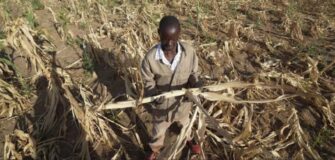Monsoon Havoc Exposes West and Central Africa’s Rising Flood Risks
Share
West and Central Africa are increasingly facing devastating impacts from monsoons and heavy seasonal rains, leading to severe flooding that threatens millions of lives and exacerbates already fragile socio-economic conditions. The flooding, which has become more frequent and intense in recent years, is exposing the rising flood risks that climate change, poor infrastructure, and deforestation are causing in the region.
Scale of the Flooding Crisis
The most recent monsoon season in West and Central Africa has caused widespread destruction, displacing millions of people, damaging critical infrastructure, and leading to a rising death toll. Countries like Nigeria, Niger, Chad, and Cameroon have experienced some of the worst flooding in decades, with entire villages submerged under water and agricultural lands devastated. The floods have destroyed homes, schools, roads, and hospitals, making it even harder for affected communities to recover.
In Nigeria, more than 1.5 million people were displaced, and hundreds of thousands of homes and buildings were damaged or destroyed by floods. Similar devastation was reported in Chad and Niger, where rivers overflowed, breaking embankments and causing widespread displacement.
Root Causes of the Rising Flood Risks
Several factors are contributing to the increasing flood risks in West and Central Africa:
Climate Change: Climate change is significantly altering weather patterns across Africa, with rising temperatures leading to more intense and erratic rainfall during the monsoon seasons. The frequency of extreme weather events such as heavy rains, flash floods, and storms has increased, leaving many areas vulnerable to devastating floods. The Intergovernmental Panel on Climate Change (IPCC) has warned that West and Central Africa are among the regions most at risk of climate-induced flooding.
Poor Urban Planning and Infrastructure: Rapid urbanization, combined with inadequate drainage systems and poor infrastructure, has worsened the impacts of flooding in urban areas. Many cities, such as Lagos, Abuja, and Douala, lack sufficient drainage and flood mitigation systems, leaving them prone to waterlogging and flash floods. As informal settlements grow in flood-prone areas, the risk to lives and property increases significantly.
Deforestation: In many parts of West and Central Africa, widespread deforestation has reduced the land’s ability to absorb excess water, leading to faster runoff during heavy rains. This has been particularly problematic in regions such as Cameroon and Guinea, where the loss of natural vegetation has contributed to soil erosion and worsened flooding during the monsoon season.
Inadequate Flood Preparedness: Many governments in West and Central Africa lack the resources and systems needed to prepare for and respond to flooding. There is often a lack of early warning systems, flood defenses, and emergency response plans, which hampers efforts to mitigate the effects of floods. This lack of preparedness makes it difficult to evacuate people and protect infrastructure before the floods hit.
Humanitarian and Economic Impact
The human toll of the flooding crisis is enormous. In addition to the immediate loss of life and displacement, the floods are causing a long-term humanitarian disaster by disrupting livelihoods, agriculture, and food security.
Displacement and Homelessness: Floods have displaced millions of people, leaving them homeless and without access to basic necessities such as clean water, food, and healthcare. In many cases, displaced people are forced to live in overcrowded temporary shelters, which increases the risk of disease outbreaks.
Agricultural Losses: Flooding has devastated agricultural lands, particularly in countries that rely heavily on farming. Crops such as maize, rice, and millet have been destroyed in key agricultural regions. This is exacerbating food insecurity in a region already grappling with chronic hunger and malnutrition.
Economic Damage: The damage to infrastructure, including roads, bridges, and power lines, has disrupted trade, transportation, and essential services. The economic cost of repairing this damage is expected to be immense, further straining already struggling economies in the region.
Calls for Action
Governments, humanitarian organizations, and climate experts are calling for urgent action to address the rising flood risks in West and Central Africa. Key recommendations include:
Strengthening Infrastructure: There is an urgent need for investments in flood defenses, drainage systems, and better urban planning to make cities more resilient to flooding.
Improving Early Warning Systems: Effective early warning systems can help communities prepare for floods, evacuate vulnerable areas, and minimize casualties. Governments and international partners need to invest in modern technologies that can predict weather patterns more accurately and issue timely warnings.
Reforestation and Land Management: Reforestation efforts and better land management practices are needed to reduce soil erosion, increase water absorption, and mitigate the impact of floods. Governments should also enforce regulations to prevent illegal logging and protect natural vegetation.
Climate Adaptation Programs: Long-term climate adaptation strategies must be implemented to help communities withstand the increasing threats posed by climate change. This includes supporting sustainable agricultural practices, building flood-resistant infrastructure, and educating communities about flood preparedness.
Conclusion
The devastating monsoon season in West and Central Africa has highlighted the urgent need for action to address rising flood risks in the region. As climate change intensifies extreme weather patterns, governments, international organizations, and local communities must work together to strengthen flood defenses, improve infrastructure, and develop long-term solutions to protect vulnerable populations from future disasters.
Image source:reuters.com








